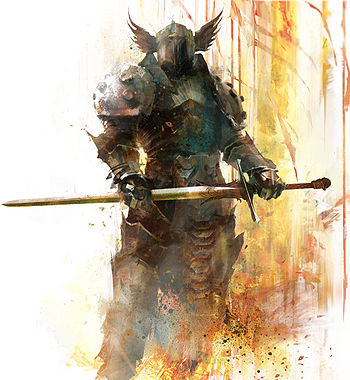What are Power Sources?
Each
class draws on something, whether it is the strength of a deity, ambient magic
or a well of experience. This is called their Power Source.
What does a Power Source do?
Immediately?
Nothing. Mechanics – wise, Power Sources come much later into character growth,
usually affecting the choices around which Archetype and which Epic Destiny the
character can choose.
Thematically
speaking, each Power Source gives a flavour to a group of classes by conforming
to a common set of themes.
What are the Power Sources?
Arcane
 Arcane
characters are unanimously magical. Their expertise lies in twisting the
ambient magic of the world to fit their own ends. Classes that are Arcane
include Wizards, Sorcerers, Bards and Artificers.
Arcane
characters are unanimously magical. Their expertise lies in twisting the
ambient magic of the world to fit their own ends. Classes that are Arcane
include Wizards, Sorcerers, Bards and Artificers.
Arcane
characters are generally very good at a distance, and between the classes, they
can provide, support, damage, healing and utility in equal measure. Arcane classes
are also uniquely flexible; many of them have access to the Arcane spell list,
and at least one method of manipulating their spells to suit their needs.
The
Arcane Power Source lacks any viable melee options, however, and have no
ability to Tank.
Divine
 Divine
characters subscribe to the will of the Gods. They are devoted to one or
several causes, and wield their deific gifts to further the ends of their
patron. Classes that are Divine include Cleric, Inquisitor and Paladin.
Divine
characters subscribe to the will of the Gods. They are devoted to one or
several causes, and wield their deific gifts to further the ends of their
patron. Classes that are Divine include Cleric, Inquisitor and Paladin.
All
Divine characters embrace the theme of defence over offence. They incorporate
some of the best healing capabilities with defensive unity that can be used up
close and personal or at a distance. Equally, a single Divine class is a force
to be reckoned with, as their God-given powers grant them many tools to fight
one or more enemies alone.
Despite
their defensive flexibility and depth of the Divine spell list, Divine classes
lack any dedicated ability to fight at range, even though some Inquisitors and
Clerics can attempt to alleviate this problem.
Martial
 Martial
characters draw on wells of experience and intense training. They do not have
supernatural powers, but rely on themselves over everything else to see the day
through. Classes that are Martial include Fighter, Ranger, Rogue and Warlord.
Martial
characters draw on wells of experience and intense training. They do not have
supernatural powers, but rely on themselves over everything else to see the day
through. Classes that are Martial include Fighter, Ranger, Rogue and Warlord.
Martial
characters are easily the most well rounded of the Power Sources, combining
offence, defence and utility in equal measure. They are generally have more Hit
Points than other classes, and any one class can be tooled to cope with any
situation.
Martial
characters also have the greatest flaw amongst the Power Sources; there is no
spell list for Martial characters. This means that Martial characters cannot
overcome more exotic foes without the aid of magical characters, and more eclectic
powers of the other Power Sources remain far out of their reach.
Primal
 Primal
characters worship Greater Spirits in the same manner that Divine characters
worship Gods. They are not bound to the service of one patron, instead
revelling in the entirety of the natural world. Classes that are Primal include
Barbarian, Druid, Elementalist and Totemic.
Primal
characters worship Greater Spirits in the same manner that Divine characters
worship Gods. They are not bound to the service of one patron, instead
revelling in the entirety of the natural world. Classes that are Primal include
Barbarian, Druid, Elementalist and Totemic.
Primal
classes contain many extremes in their lineup. Many of them, Barbarian in
particular, can only do one role at a time, whereas many other classes can
potentially fill several roles. Nevertheless, all Primal classes are powerful,
and contain aspects and combinations of powers that are not present in other
Power Sources.
Psionic
 Psionic
characters use the mind to wield the power of the immortal soul. They are
uniquely powerful, and make use of exotic power mechanics. Classes that are
Psionic include Chronarch, Monk and Psion.
Psionic
characters use the mind to wield the power of the immortal soul. They are
uniquely powerful, and make use of exotic power mechanics. Classes that are
Psionic include Chronarch, Monk and Psion.
Psionic
classes follow a theme of spending. Each one has a resource, whether it be
Seconds, Ki or Power Points, which they use to augment their spells and powers.
As a result, Psionic characters can manipulate their functions to perform
exceedingly well in and out of combat.
Despite
all of their power, Psionic classes are limited to how far they can push
themselves. When their Psionic Resources run dry, they must use more mundane
methods of combat, which in turn is generally less effective than other
classes.
Shadow
Shadow
characters have a relationship with darkness as an entity. Although they have a
potentially evil source, a Shadow character is no less inclined to do good or
evil. Classes that belong to the Shadow Source include Doomguard, Faustian and
Shadowdancer.
Shadow
classes run under the theme of the pact. Every one of them includes an aspect
of their soul that has been given away, or turned into something more malefic.
Their class powers allow them to cover the whole spectrum of party needs.
Although
a Faustian can aid a party, this Power Source has no dedicated healers amongst
its ranks. In addition, many of the more exotic powers at the Shadow Source’s
disposal require precise conditions, making them situational and inflexible.
[Kudos to a Google for th epictures. You all know the drill by now.]

No comments:
Post a Comment